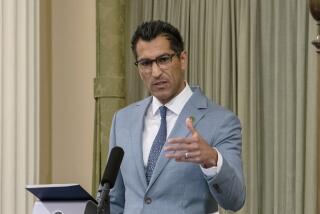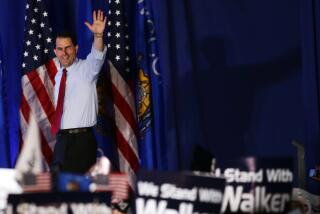CAMPUS CORRESPONDENCE : Don’t Tax the Most Precious of Investments--a College Education : Tuition: Although the a proposed levy at Northwestern is small, its approval would give the green light to cities looking for new revenue sources.
- Share via
EVANSTON, ILL. — I always thought that the best investments were tax exempt. But a proposal to tax tuition at Northwestern University threatens to end the special status of the most precious investment of all--a college education.
The very idea of imposing a levy on tuition is ridiculous. Government, from local to federal, should be doing more to help students get educations--not imposing another surcharge on the already exorbitant cost of college tuition.
Fortunately, the mayor of Evanston vetoed the bill last Thursday. But the proposal’s chief sponsor on the City Council has vowed to seek an override on Sept. 24. If he succeeds, other revenue-starved cities across the United States are bound to follow Evanston’s lead.
The lake-front property that Northwestern occupies is tax exempt. The campus, however, is served by Evanston’s police and fire departments. When some aldermen thought this was unfair, the students were stuck in the middle.
The aldermen don’t seem to care that students pour a tremendous amount of money into the city’s coffers by patronizing local businesses. It doesn’t matter to them that we serve the community through various volunteer groups. The only important thing was that they could tap into a new source of money.
True, the proposed $45 tax seems minuscule when compared with the nearly $10,000 annual tuition at Northwestern, the only private university in the Big Ten. But to a student, every dollar counts. The cost--tuition, books, room and board--of my four years at the university will total more than $80,000. I must rely on my parents’ contributions, my savings and a combination of job, loans, scholarship and grants, which seem to dwindle every year.
But the size of the tax isn’t nearly as irritating as its implications. If Evanston could tax Northwestern students, why couldn’t Palo Alto do the same thing to Stanford students? Wouldn’t Ithaca be tempted to tax the Cornell student body, too? Taxing tuition could catch on in all college towns.
This scares me, for it would contribute to the growing educational rift in our country. Only half the nation’s graduating high school seniors go directly to four-year colleges, many because they cannot afford to do so. Student options are further limited by the higher tuition at private schools. Taxing their tuitions would make them even more inaccessible. Indeed, cities that host high-priced universities attended by mostly affluent students might be tempted to add still other taxes.
In high school, I knew several students who had to settle for their second or third choices of college because their No. 1 pick could not provide enough financial aid. I also know students who have had to leave Northwestern because their financial status changed and the school could not make up the difference.
As a student dependent on financial aid to stay in school, I know the uneasiness of wondering if federal aid programs will be cut further. I feel the pressure of having to maintain a high grade-point average to remain eligible for scholarships. I regard any cost increase as threatening my education.
While I’m skeptical of the usual justifications for annual tuition increases, I realize it is costly to maintain a quality educational environment with top-notch professors, equipment and facilities. But when a group of aldermen try to raise the cost of education just because they feel more money should come their way, I’m angry.
By deciding to attend a private school, I accepted the fact that there will be a heavy price to pay. In addition to the money I am now paying, I will have at least $1,500 in loans to repay after I graduate. But that shouldn’t mean that I can be further penalized.
More important than a tuition tax’s impact on individual students, however, is how it might affect the overall equality of educational opportunity. The best way for the United States to remain a world leader, stay on technology’s cutting edge, combat racism and provide an opportunity for every person to realize his or her potential is to educate its citizens. A tax on tuition might be the difference between some of these students going to college and some having to postpone--maybe forever--their education.
A college education is an invaluable investment in the future, an investment guaranteed to yield dividends. An education is something you allow to grow. It isn’t something you should inhibit or offer to a limited number of people. And it certainly isn’t something you should tax.
More to Read
Sign up for Essential California
The most important California stories and recommendations in your inbox every morning.
You may occasionally receive promotional content from the Los Angeles Times.












